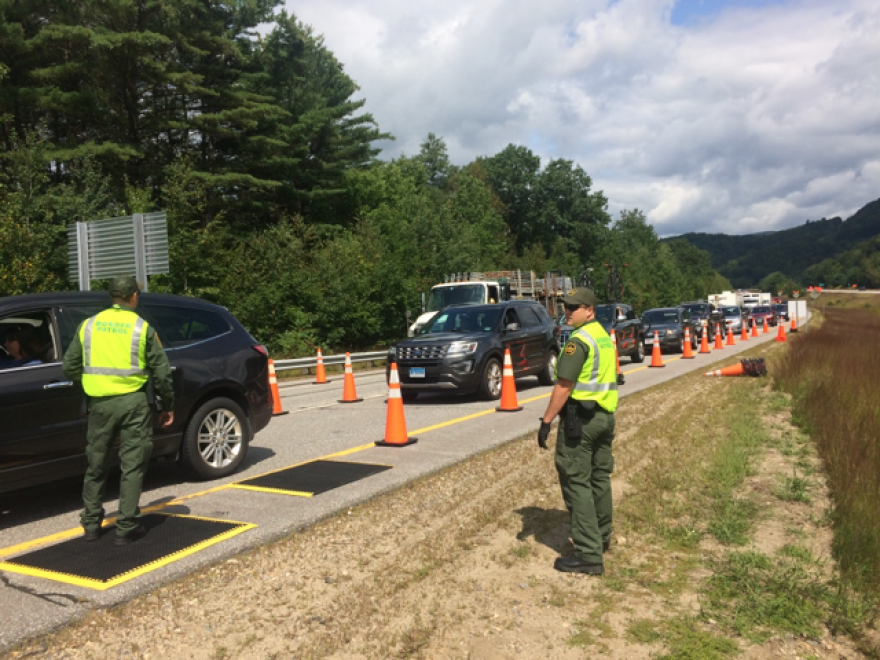U.S. Customs and Border Protection has been running checkpoints in New Hampshire more frequently under the Trump administration, setting up on Interstate 93 near the small towns of Woodstock and Lincoln.
The stated goal of these stops is enforcing immigration law, and to that end, they have been fairly successful. Agents have arrested more than 50 people over the past two years who they determined to be in the country illegally.
But those in support of the stops are often quick to turn attention to a topic other than immigration: drugs and the state’s opioid crisis.
“There have been drug busts. We’ve been able to seize paraphernalia and drugs,” said Governor Chris Sununu, when asked about the checkpoints by reporters last month. “They seem to work fairly responsibly and reasonably in the state of New Hampshire.”

The connection between drugs, illegal immigration and crime is not a new one -- it’s part of the standard argument President Donald Trump makes for ramping up enforcement.
“For decades, open borders have allowed drugs and gangs to pour into our most vulnerable communities,” he said at his State of the Union address earlier this year.
Here in New Hampshire, despite the political divide on immigration issues, checkpoints are broadly accepted by at least one measure. Roughly 70 percent of residents said they supported the stops as a check on immigration, and to investigate potential drug smuggling, in a survey conducted last year by researchers at the University of New Hampshire.

A focus on crime rings true, as well, in the towns of Woodstock and Lincoln, where agents have been setting up.
“To us, it’s more about the drugs than the immigration,” said Rebecca Borges, a waitress at Sunny Day Diner in Lincoln and a nearly 20-year resident of the area. “It’s been getting pretty bad with a lot of children in this area. We’ve had a couple deaths.”
'If somebody catches a heroin dealer in my community and puts them in jail, I'll shake their hand twice.'
Sure, she said, there’s downsides to the checkpoints. For one, they cause traffic to backup. But if you’re a local, she said, you know how to take the side roads.
Down the road, John Payne runs an inn with his wife. He actually got stopped in the checkpoints this year with two young Chinese women they had working for them this summer on visas.
The agents suspected Payne might be trafficking the girls, he said. But after some delay, they were sent on their way. He took it as a good sign, rather than a headache. “If they’re catching human traffickers, all power to them,” he said.
In his view, it helps to have another eye out, in general, for illegal behavior. “If somebody catches a heroin dealer in my community and puts them in jail, I’ll shake their hand twice,” he said.
The vast majority of drugs seized at these checkpoints, though, have not been heroin, cocaine, methamphetamine, or fentanyl. Instead, it’s been marijuana and derivatives – things like edibles and hash oil.
Simply put, “the checkpoints haven’t caught drug traffickers,” said Gilles Bissonnette, legal director for the New Hampshire ACLU.
'These are family members, these are kids, these are parents. These are not drug dealers'
Bissonnette has been fighting the checkpoints. He won a court battle to have drug evidence thrown out from a couple stops in 2017, arguing the way the searches were performed was illegal under the state constitution.
Most people caught with drugs in these stops have been carrying only small, personal use amounts, he said. And any notion that the checkpoints are making a dent in the state’s drug crisis are unfounded. “These are family members, these are kids, these are parents,” he said. “These are not drug dealers as people have been suggesting.”
Back in Woodstock, Roberta Vigneault, a financial manager at the Woodstock Inn, agreed. “We do have a drug problem in this town,” she said. “Is [a checkpoint] going to stop that? No.”
The stops have been all over the news. Dealers know what they’re doing, she said, they’ll just avoid the interstate all together.
The most recent checkpoint, just a couple weeks ago, resulted in no drug or immigration arrests, according to Border Patrol.








